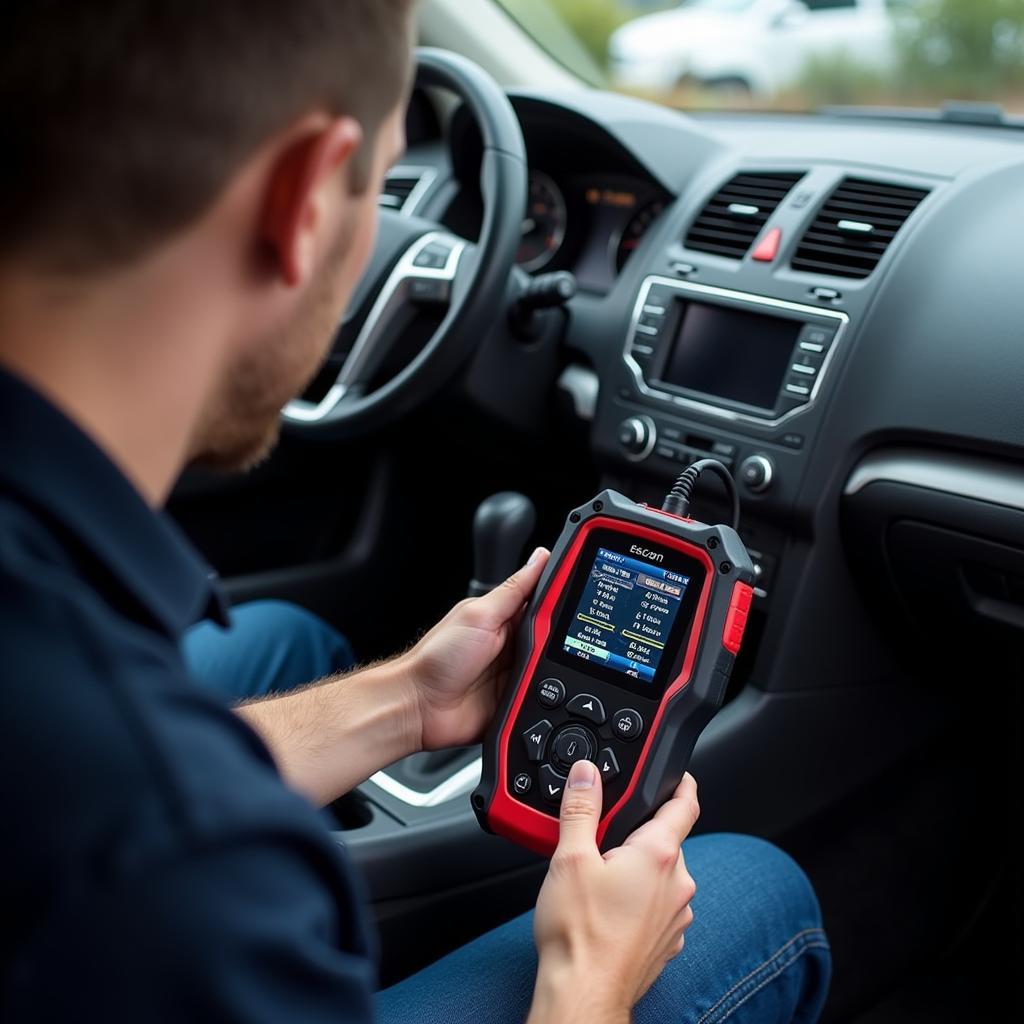As a car owner or automotive professional, a reliable diagnostic scan tool is essential. Whether you’re troubleshooting a check engine light, performing routine maintenance, or delving into complex electrical issues, the Best Diagnostic Scan Tool can save you time, money, and frustration. This guide explores everything you need to know about selecting and using a professional-grade scan tool.
Investing in a high-quality scan tool can empower you to diagnose car problems accurately. Choosing the right one can be daunting, given the vast array of options available. Check out our article on the best diagnostic scan tool for shop for a curated selection of top-rated tools.
Understanding Your Needs: Different Strokes for Different Folks
Before diving into the specifics of various scan tools, it’s crucial to identify your individual needs. Are you a DIY enthusiast working on your own vehicle, or a professional technician dealing with a wide range of makes and models? The best diagnostic scan tool for a home mechanic might differ significantly from the one used in a professional shop.
DIY Enthusiast: Basic to Intermediate Functionality
For the average car owner, a basic to intermediate scan tool can handle most common tasks. These tools typically offer functionalities such as reading and clearing diagnostic trouble codes (DTCs), viewing live data streams from various sensors, and performing basic system tests.
Professional Technician: Advanced Features and Bi-Directional Control
Professional technicians require more advanced scan tools with capabilities like bi-directional control, which allows them to activate components like actuators, solenoids, and relays for testing purposes. These tools often include features like oscilloscope functionality, programming capabilities, and access to manufacturer-specific data.
Key Features to Consider: What Makes a Scan Tool Great?
When choosing the best diagnostic scan tool, consider the following key features:
- Vehicle Coverage: Ensure the scan tool is compatible with the make, model, and year of your vehicle(s).
- Code Reading and Clearing: This is a fundamental function of any scan tool.
- Live Data Streaming: Allows you to monitor real-time sensor data to diagnose issues.
- Bi-Directional Control: Enables testing of components by activating them remotely.
- Special Functions: Look for features like ABS bleeding, DPF regeneration, and key programming.
- User Interface: A user-friendly interface is essential for efficient operation.
- Durability and Portability: Choose a tool that is built to withstand the rigors of a shop environment.
For those looking for affordable options, consider exploring our recommendations for diagnostic scan tool for all cars 2017 – under 250$.
What is the Price Range of Diagnostic Scan Tools?
Diagnostic scan tools range in price from under $50 for basic code readers to several thousand dollars for professional-grade tools. The price depends on the features and capabilities of the tool.
How Do I Use a Diagnostic Scan Tool?
Using a diagnostic scan tool is generally straightforward. Locate your vehicle’s OBD-II port (usually under the dashboard), plug in the scan tool, turn on the ignition, and follow the on-screen prompts to read and clear codes or access other functions.
“Choosing the right scan tool is an investment that pays off in the long run. It’s like having a mechanic in your pocket, ready to diagnose problems whenever they arise.” – John Davis, Automotive Engineer
Beyond the Basics: Advanced Diagnostics and Software Updates
As vehicle technology evolves, so too must diagnostic tools. Keeping your scan tool’s software updated is crucial for maintaining compatibility with newer vehicles and accessing the latest diagnostic functionalities. Some advanced scan tools offer features like wireless connectivity, cloud-based data storage, and remote diagnostics. If you own a BMW E46, check our dedicated article on the scan tool for bmw e46.
Conclusion: Empowering You to Take Control of Your Car’s Health
The best diagnostic scan tool is the one that meets your specific needs and budget. By understanding the various features and functionalities available, you can make an informed decision that will empower you to diagnose and resolve car problems effectively. Contact ScanToolUS at +1 (641) 206-8880 or visit our office at 1615 S Laramie Ave, Cicero, IL 60804, USA for personalized assistance.
“Regularly scanning your vehicle with a good diagnostic tool can help prevent small problems from becoming big, expensive headaches.” – Maria Sanchez, Certified Automotive Technician
FAQ
-
What is a diagnostic scan tool? A diagnostic scan tool is an electronic device that connects to a vehicle’s onboard computer to retrieve diagnostic trouble codes (DTCs) and other data.
-
Do I need a professional-grade scan tool? It depends on your needs. DIY enthusiasts can often get by with a basic scan tool, while professionals require more advanced features. Consider looking at our resource on diagnostic scan tool for all cars 2019 – under 300.
-
Can a scan tool fix my car? No, a scan tool diagnoses problems; it doesn’t fix them. It provides information to help you or a mechanic identify and address the issue.
-
How often should I use a diagnostic scan tool? For routine maintenance, scanning your vehicle every few months is a good practice. If you experience any warning lights or unusual performance, use the scan tool immediately.
-
What is an OBD-II port? The OBD-II port is a standardized 16-pin connector found in most vehicles manufactured after 1996. It provides access to the vehicle’s onboard diagnostic system.
-
Are all scan tools compatible with all cars? No, compatibility varies. Ensure the scan tool you choose is compatible with the make, model, and year of your vehicle.
-
Can I update my scan tool’s software? Most scan tools offer software updates, either free or for a fee. Updates are important for maintaining compatibility with newer vehicles.

